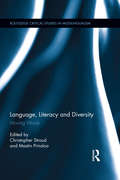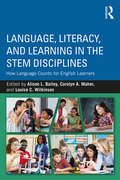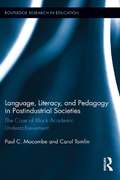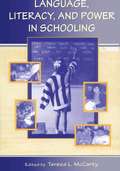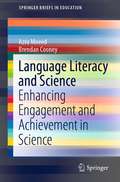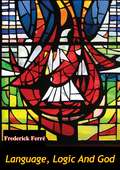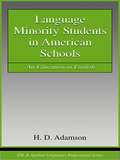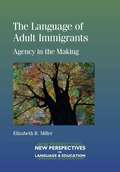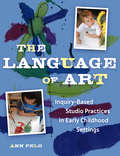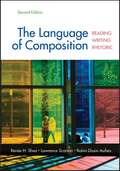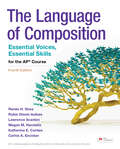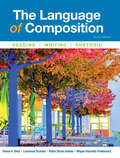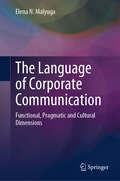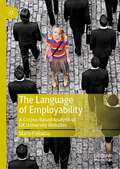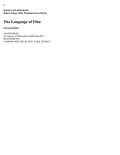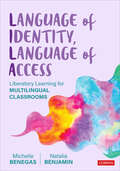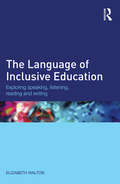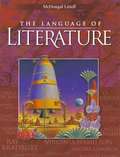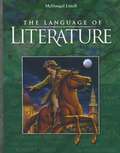- Table View
- List View
Language, Literacy and Diversity: Moving Words (Routledge Critical Studies in Multilingualism)
by Christopher Stroud Mastin PrinslooLanguage, Literacy and Diversity brings together researchers who are leading the innovative and important re-theorization of language and literacy in relation to social mobility, multilingualism and globalization. The volume examines local and global flows of people, language and literacy in relation to social practice; the role (and nature) of boundary maintenance or disruption in global, transnational and translocal contexts; and the lived experiences of individuals on the front lines of global, transnational and translocal processes. The contributors pay attention to the dynamics of multilingualism in located settings and the social and personal management of multilingualism in socially stratified and ethnically plural social settings. Together, they offer ground-breaking research on language practices and documentary practices as regards to access, selection, social mobility and gate-keeping processes in a range of settings across several continents: Africa, Asia, the Americas and Europe.
Language, Literacy, and Learning in the STEM Disciplines: How Language Counts for English Learners
by Alison L. Bailey Carolyn A. Maher Louise C. WilkinsonWith a focus on what mathematics and science educators need to know about academic language used in the STEM disciplines, this book critically synthesizes the current knowledge base on language challenges inherent to learning mathematics and science, with particular attention to the unique issues for English learners. These key questions are addressed: When and how do students develop mastery of the language registers unique to mathematics and to the sciences? How do teachers use assessment as evidence of student learning for both accountability and instructional purposes? Orienting each chapter with a research review and drawing out important Focus Points, chapter authors examine the obstacles to and latest ideas for improving STEM literacy, and discuss implications for future research and practice.
Language, Literacy, and Pedagogy in Postindustrial Societies: The Case of Black Academic Underachievement (Routledge Research in Education #91)
by Paul C. Mocombe Carol TomlinIn postindustrial economies such as the United States and Great Britain, the black/white achievement gap is perpetuated by an emphasis on language and language skills, with which black American and black British-Caribbean youths often struggle. This work analyzes the nature of educational pedagogy in the contemporary capitalist world-system under American hegemony. Mocombe and Tomlin interpret the role of education as an institutional or ideological apparatus for capitalist domination, and examine the sociolinguistic means or pedagogies by which global and local social actors are educated within the capitalist world-system to serve the needs of capital; i.e., capital accumulation. Two specific case studies, one in the United States and one in the United Kingdom, are utilized to demonstrate how contemporary educational emphasis on language and literacy parallels the organization of work and contributes to the debate on academic underachievement of black students vis-a-vis their white and Asian counterparts.
Language, Literacy, and Power in Schooling
by Teresa L. McCartyLanguage, Literacy, and Power in Schooling brings critical ethnographic perspectives to bear on language, literacy, and power in culturally and linguistically diverse contexts, showing how literacy and schooling are negotiated by children and adults and how schooling becomes a key site of struggle over whose knowledge, discourses, and literacy practices "count." Part I examines tensions between the local and the general in literacy development and use; Part II considers face-to-face interactions surrounding literacy practices in ethnically diverse classrooms; and Part III widens the ethnographic lens to position literacy practices in the context of globalization and contemporary education policies. Each section includes a substantive introduction by the editor and a synthetic commentary by a leading literacy researcher.Above all, this is a book oriented toward social action. Unpacking the complexity of literacy practices and experiences in diverse settings, the authors seek not only to build new knowledge, but to inform and transform the pedagogies and policies that limit human potentials. The chapters in this volume have much to teach us about the roots of inequality and the possibilities for positive change. Together, they highlight the urgent need for critical literacy researchers to engage politically, confronting education policies that deny the rich multiplicity of human literacies, thereby carving ever-deeper cleavages between those with and without access to literacies of power.The dual focus on language and literacy with critical-ethnographic accounts of identity and schooling speaks to a growing constituency of scholars and practitioners concerned with the role of literacy and discourse in alternatively affirming or negating knowledge, power, and identity, both within and outside of schools.
Language Literacy and Science: Enhancing Engagement and Achievement in Science (SpringerBriefs in Education)
by Azra Moeed Brendan CooneyThis book presents the findings of two case studies in the 'Making Connections' two-year project funded by the New Zealand Ministry of Education. It shows how science literacy was improved in a state coeducational school with Pacific Island students from diverse linguistic backgrounds. This book details ideas and strategies relevant to schools where English literacy has an impact on the science engagement and achievement of ethnically diverse student populations. It also presents the teaching as inquiry model and its usage by teachers to improve aspects of their teaching strategies.
Language, Literacy, and Technology
by Richard KernFrom the origins of writing to today's computer-mediated communication, material technologies shape how we read and write, how we construe and share knowledge, and ultimately how we understand ourselves in relation to the world. However, communication technologies are themselves designed in particular social and cultural contexts and their use is adapted in creative ways by individuals. In this book, Richard Kern explores how technology matters to language and the ways in which we use it. Kern reveals how material, social and individual resources interact in the design of textual meaning, and how that interaction plays out across contexts of communication, different situations of technological mediation, and different moments in time. Showing how people have adapted visual forms to various media as well as to social needs, this study culminates in five fundamental principles to guide language and literacy education in a period of rapid technological and social change.
Language, Logic And God
by Frederick Ferré"THIS BOOK is an attempt to fill the present striking need for an introduction to contemporary linguistic philosophy as it bears on theological discourse. Wherever I have gone, recently, among educated Christians in Britain and America, I have encountered profound curiosity--and a good deal of anxiety--concerning modern methods in philosophy as they relate to the logical nature and validity of theological affirmations. Similarly I have found many of my students in contemporary philosophy and in the philosophy of religion becoming deeply absorbed in the issues raised by a critical examination of theological speech. From both groups, the intellectually alert Christians and the thoughtful graduate and undergraduate students of philosophy and religion, I have been heavily bombarded with appeals for direction to some book which would (1) set forth the central issues and arguments concerning theological discourse for readers who have familiarity with traditional philosophy but who are relatively untrained in contemporary philosophical practices and (2) place into perspective the present state of philosophical and theological discussion in this area of burgeoning interest. To my frustration, I have had to answer such requests with the admission that no such book exists and with the promise that I would try, some day, to provide that book myself. In preparing this volume, therefore, I have done my best to keep those promises in mind."
Language Minority Students in American Schools: An Education in English (ESL & Applied Linguistics Professional Series)
by H. D. AdamsonThis book addresses questions of language education in the United States, focusing on how to teach the 3.5 million students in American public schools who do not speak English as a native language. These students are at the center of a national debate about the right relationship among ESL, bilingual, and mainstream classes. Bilingual education has been banned by constitutional amendment in California and Arizona, and similar amendments are being considered in other states. Language Minority Students in American Schools: An Education in English places this debate and related issues of teaching standard English to speakers of nonstandard dialects, such as black English, within the larger context of language acquisition theory and current methods of language teaching. Adamson draws from the large body of sociolinguistic, psycholinguistic, and educational research, and on his own experience as an English teacher in the U.S. and overseas, to shed light on some of these controversies and on the cognitive, cultural, public policy, and practical issues involved in educating English language learners. Presenting all sides of the issues fairly, he offers a strong endorsement for bilingual and bidialectical education based on programs designed and administered according to the principles discussed in the book and supported by language acquisition theory and classroom research. A strength of the book is the inclusion of original research conducted in a middle school enrolling a majority of Latino students. This research contributes to the field of language education by providing a detailed description of how English language learners study content subjects. Examples from the study are used to illustrate a discussion of Vygotskian learning principles and the relationship between the students' home and school cultures. Language Minority Students in American Schools: An Education in English is intended for students who are preparing to become teachers of English as a second language, and for teachers of other subjects who work with English language learners.
The Language of Adult Immigrants
by Elizabeth R. MillerThis book is the first to explore the constitution of language learner agency by drawing on performativity theory, an approach that remains on the periphery of second language research. Though many scholars have drawn on poststructuralism to theorize learner identity in non-essentialist terms, most have treated agency as an essential feature that belongs to or inheres in individuals. By contrast, this work promotes a view of learner agency as inherently social and as performatively constituted in discursive practice. In developing a performativity approach to learner agency, it builds on the work of Vygotsky and Bakhtin along with research on 'agency of spaces' and language ideologies. Through the study of discourses produced in interviews, this work explores how immigrant small business owners co-construct their theories of agency, in relation to language learning and use. The analysis focuses on three discursive constructs produced in the interview talk-subject-predicate constructs, evaluative stance, and reported speech-and investigates their discursive effects in mobilizing ideologically normative, performatively realized agentive selves.
The Language of Art
by Ann PeloIncorporate inquiry-based practices into your early childhood classroom or family child care program. Inspired by an approach to teaching and learning born in Reggio Emilia, Italy, The Language of Art emphasizes investigation anchored by drawing, painting, and other art activities. It provides:advice on setting up a studio space for art and inquirystudio explorations designed to give children a basic fluency in artsuggestions for documenting children's developing fluency with art media and its use in inquiryguidelines for using children's new-found fluency as a tool for investigation.Even if you use a space not designed specifically for art instruction or even for an early childhood program, The Language of Art shows how you can simply start where you are.
The Language of Choice Theory
by William GlasserIn this companion volume to the bestselling Choice Theory, Dr. William Glasser and his wife, Carleen Glasser, have imagined typical conversations in real-life situations--between parent and child, two partners in a relationship, teacher and student, and boss and employee. On the left-hand page is a typical controlling order or threat, and on the right a more reasonable version, using choice theory, which is more likely to get a favorable response from the child, lover, student, or employee. Through these examples, the principles of choice theory come alive.
The Language of Choice Theory
by William GlasserIn this companion volume to the bestselling Choice Theory, Dr. William Glasser and his wife, Carleen Glasser, have imagined typical conversations in real-life situations--between parent and child, two partners in a relationship, teacher and student, and boss and employee. On the left-hand page is a typical controlling order or threat, and on the right a more reasonable version, using choice theory, which is more likely to get a favorable response from the child, lover, student, or employee. Through these examples, the principles of choice theory come alive.
The Language Of Composition: Reading, Writing, Rhetoric
by Lawrence Scanlon Robin Aufses Renee SheaThe Language of Composition is the first textbook built from the ground up to help students succeed in the AP English Language course. Written by a team of experts with experience in both high school and college, this text focuses on teaching students the skills they need to read, write, and think at the college level. With practical advice and an extensive selection of readings -- including essays, poetry, fiction, and visual texts --The Language of Composition helps students develop the key skills they must master to pass the course, to succeed on the AP Exam, and to prepare for a successful college career. Revised based on feedback from teachers across the country, the second edition promises to be an even better resource for the AP Language classroom.
The Language of Composition: Reading, Writing, Rhetoric
by Renée H. Shea Lawrence Scanlon Robin Dissin AufsesNIMAC-sourced textbook
The Language of Composition: Essential Voices, Essential Skills for the AP® Course
by Renee H. Shea Lawrence Scanlon Robin Dissin Aufses Megan M. Harowitz Katherine E. Cordes Carlos EscobarEverything You Need to Succeed in AP® Language.Give yourself the best foundation to earn a great score.The Language of Composition includes all of the skills instruction, practice, readings, and AP® tips you need to be successful on the AP® Language and Composition Exam.
The Language of Composition: Reading, Writing, Rhetoric
by Renée H. Shea Lawrence Scanlon Robin Dissin Aufses Megan Harowitz PankiewiczFor over a decade, The Language of Composition has been the most successful textbook written for the AP® English Language and Composition Course. Now, its esteemed author team is back, giving practical instruction geared toward training students to read and write at the college level. The textbook is organized in two parts: opening chapters that develop key rhetoric, argument, and synthesis skills; followed by thematic chapters comprised of the finest classic and contemporary nonfiction and visual texts. With engaging readings and reliable instruction, The Language of Composition gives every students the opportunity for success in AP® English Language.
The Language of Corporate Communication: Functional, Pragmatic and Cultural Dimensions
by Elena N. MalyugaThis book explores diverse cultural and linguistic landscapes, unraveling the fusion of language, culture, and corporatism. It breaks new ground by examining lesser-known linguistic-cultural aspects of corporate communication. It provides deeper insights into conversational practices, cultural variations, and gender-specific speech aggression within the corporate realm. The book delves into functional aspects, such as corporate terminology and stylistic techniques, as well as the pragmatic dimension with humor and emotive language. Offering a unique perspective on corporate language, it deepens understanding of semantic dynamics and emphasizes language's power to meet diverse communication needs. The book is a must-read for corporate professionals, linguists, scholars, business leaders, communication consultants, and educators teaching the language of business and corporate communication. It is also an invaluable asset for anyone seeking to navigate the intricacies of corporate communication in today's globalized business landscape.
The Language of Employability: A Corpus-Based Analysis of UK University Websites
by Maria FotiadouThis book employs a corpus-based Critical Discourse Analysis (CDA) methodology to analyse the language used by university careers services in the UK. Drawing on a corpus which includes the public-facing websites of careers services from 24 Russell Group and 34 Post-92 universities, the author highlights some of the potentially problematic 'common-sense' views and ideas that are currently promoted to students using these services. She argues that the language used by university websites promotes neoliberal ideology and encourages the denaturalisation of such language. This book will be of interest to linguists, sociologists, education scholars, and scholars who are otherwise interested in the notion of employability.
The Language Of Film (Basics Film-making Ser.)
by Robert Edgar John Marland Steven RawleAn effective filmmaker needs to have a good understanding of how film language works, and more importantly, how to actively influence an audience's thoughts and feelings and guide their gaze around the screen. Packed with examples from classic and contemporary cinema, The Language of Film reveals the essential building blocks of film and explains how the screen communicates meaning to its audience. You will learn about fundamental theories and concepts, including film semiotics, narrative structures, ideology, and genre, as well as how elements such as shot size, camera movement, editing technique, and color come together to create the cinematic image. With insightful case studies and discussion questions, dozens of practical tips and exercises, and a new chapter on film sound, this new edition of The Language of Film is a must-have guide for aspiring filmmakers.
Language of Identity, Language of Access: Liberatory Learning for Multilingual Classrooms
by Michelle Benegas Natalia BenjaminGrow students’ linguistic capital AND value their home language In Language of Identity, Language of Access, authors Michelle Benegas and Natalia Benjamin highlight the urgent need for a revolution in language education that validates home languages and dialects while equipping students with the linguistic tools for social mobility. Their original LILA framework rejects the socially constructed hierarchy of languages and provides students with a broader linguistic repertoire. This accessible and teacher-friendly guide presents an overview of this liberatory approach to language and literacy, an exploration of linguistically sustaining and expanding instruction, and practical guidance on designing lessons that attend to the language of identity and the language of access. Additional recurring features include: Voces provide real-life teacher experiences from the classroom Reflecciónes encourage educators to consider how principles and ideas relate to current practice and promote translanguaging Practical applications of theories (PATs) provide conceptual frameworks and lesson plans on various topics and activities. End of Chapter Conversaciónes encourage dialogue and enable educators to implement concepts in their classrooms. Offering a fresh perspective on academic language as a means to access power and social capital, Language of Identity, Language of Access is a guide for ALL educators committed to linguistically sustaining pedagogies and empowering students with linguistic capital for social mobility.
Language of Identity, Language of Access: Liberatory Learning for Multilingual Classrooms
by Michelle Benegas Natalia BenjaminGrow students’ linguistic capital AND value their home language In Language of Identity, Language of Access, authors Michelle Benegas and Natalia Benjamin highlight the urgent need for a revolution in language education that validates home languages and dialects while equipping students with the linguistic tools for social mobility. Their original LILA framework rejects the socially constructed hierarchy of languages and provides students with a broader linguistic repertoire. This accessible and teacher-friendly guide presents an overview of this liberatory approach to language and literacy, an exploration of linguistically sustaining and expanding instruction, and practical guidance on designing lessons that attend to the language of identity and the language of access. Additional recurring features include: Voces provide real-life teacher experiences from the classroom Reflecciónes encourage educators to consider how principles and ideas relate to current practice and promote translanguaging Practical applications of theories (PATs) provide conceptual frameworks and lesson plans on various topics and activities. End of Chapter Conversaciónes encourage dialogue and enable educators to implement concepts in their classrooms. Offering a fresh perspective on academic language as a means to access power and social capital, Language of Identity, Language of Access is a guide for ALL educators committed to linguistically sustaining pedagogies and empowering students with linguistic capital for social mobility.
The Language of Inclusive Education: Exploring speaking, listening, reading and writing
by Elizabeth WaltonThe Language of Inclusive Education is an insightful text which considers the writing, speaking, reading and hearing of inclusive education. Based on the premise that humans use language to construct their worlds and their realities, this book is concerned with how language works to determine what we know and understand about issues related to in/exclusion in education. Using a variety of analytical tools, the author exposes language-at-work in academic and popular literature and in policy documents. Areas of focus include: What inclusive education means and how it is defined How metaphor works to position inclusive education How textbooks construct inclusive education How we use language to build what we understand to be difference and disability, with particular reference to AD(H)D and Asperger’s Syndrome Listening to children and young people as a means to promote inclusion in schools Woven through this volume is the argument for a more critical awareness of how we use language in the field that we call ‘inclusive education’. This book is a must-read for any individual studying, practicing or an interest in inclusion and exploring the associations with language.
The Language of Literature (Grade #9)
by Arthur N. Applebee Andrea B. Bermudez Sheridan Blau Rebekah Caplan Peter Elbow Susan Hynds Judith A. Langer James MarshallThe Language of Literature provides the readers with abundant pleasuring reading materials with a rich content such as The Power of Storytelling, Passages, Voices of Experience, All in the Family, A World of Mysteries, The Classic Tradition. An additional attractive feature of Student Resource Bank contains Glossary of Literary Terms, Writing Handbook, Communication Handbook and Grammar Handbook.
The Language of Literature (Grade #7)
by Arthur N. Applebee Andrea B. Bermúdez Sheridan Blau Rebekah Caplan Peter Elbow Susan Hynds Judith A. Langer James MarshallBecoming an Active Reader involves more than just enjoying the power of storytelling. To understand and appreciate the literature in this book, you'll need to learn and apply the reading strategies.
The Language of Literature (Grade #8)
by Andrea B. Bermúdez Sheridan Blau Rebekah Caplan Peter Elbow Susan Hynds Judith A. Langer James Marshall Arthur N. ApplebeeBecoming an Active Reader involves more than just enjoying the power of storytelling. To understand and appreciate the literature in this book, you'll need to learn and apply the reading strategies listed here. As you begin to learn the strategies and how to use them, stop from time to time to monitor how well they are working for you. If it helps your reading, modify the strategies as necessary to suit your needs.
